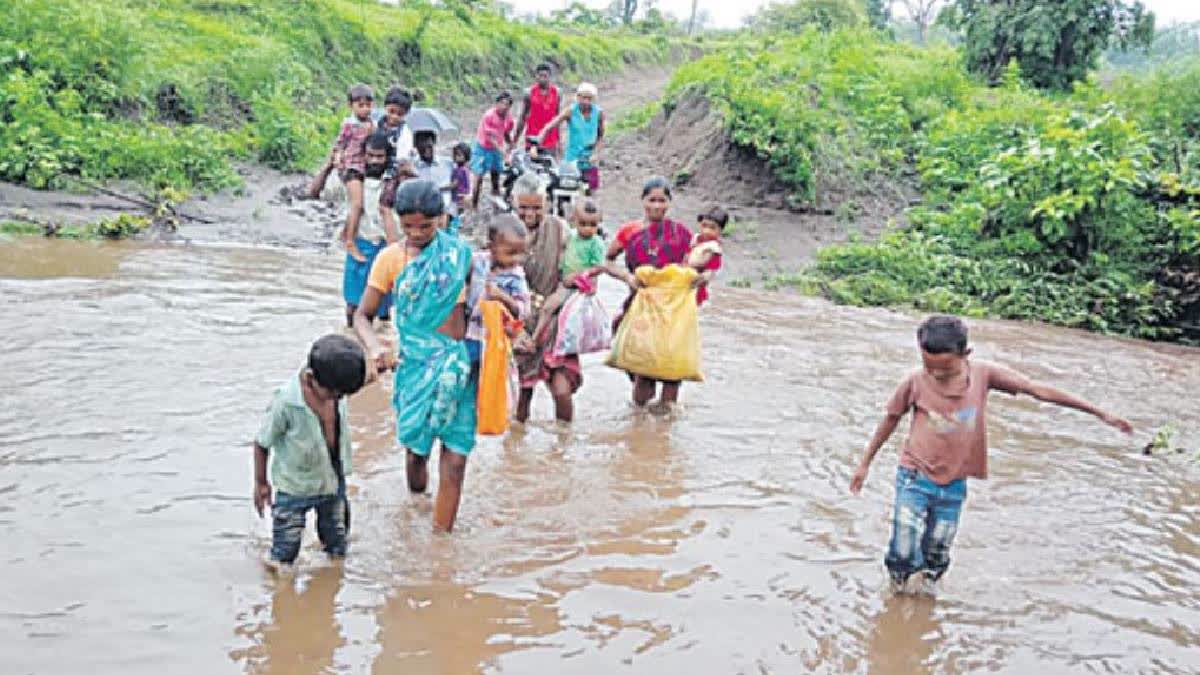Hyderabad: They get up early in the morning, cook food, pack it in boxes for the elderly and infants at home and venture out with their children. Then they trek for many kimometres down the stony paths, crossing streams, hills and forests. But, all this is not to earn money but for the festival of democracy.
This is the story of several Adivasis who toil hard for exercising their democratic rights. Neither the political parties nor the candidates or administration realise the pains they go through.
The tribals of the joint Adilabad, Khammam, Warangal, and Mahbubnagar districts have to stay away from the settlements to cast their votes. As many of the remote areas do not have any road connectivity, voters have to walk down for miles. Even if they leave early in the morning with the children, it is very difficult for them to reach the polling stations on time. The elderly and disabled people and the pregnant women are unable to exercise their voting rights as it is very difficult for them to reach the polling stations.
Even though the tribals spend their energy and time to participate in the democratic process, campaigning in their villages is a challenge for the leaders and candidates. Tribals rued that no heavyweight leader would ever come to their village.
In places where transportation is available, local leaders use tractors and bullock carts to ferry voters to the polling stations. Renting a vehicle by themselves is an extremely costly affair, so many voters take help from these local leaders. Tribals said that even if it is not possible to bring the EVMs to their villages, the Election Commission of India should arrange vehicles for them on the day of polling.
Voters from Penugolu, Wajedu Mandal in Mulugu district have to walk 20 km to reach their nearest polling station while those from Jangalapalli, Venkatapuram mandal in Pamnur travel 13 km. Voters from Gothikoya villages in Mangapet Mandal are located in the most remotest part of the state. Despite this, most of the voters come to cast their votes.
There are 76 voters in Adivaramavaram, an Adivasi area in Allepally mandal of Bhadradri district. They walk 14 km to reach the polling centre in Damaratogu, Gundala mandal. Similarly, 36 voters from a tribal village called Dongatogu, located in an island-like area, have to cross the Kinnerasani stream and travel 9 km to reach Muttapuram polling station.
A similar situation prevails for the voters from the villages of Nallachelaka, Vennelabailu, Lingapuram, and Regulagudem in Gundala mandal of Bhadradri-Kottagudem district and those of Pinapaka, Allepally, and Edullabayaram Mandals in this district
More than half of the villages in the 25 gram panchayats of the Tiryani mandal of Kumurabhim-Asifabad district have polling centres at least five km away. The 450 voters of Tatimadara, Buggaguda, Pankidi, and Bhinjiguda villages in Bhinjiguda Panchayat walk a minimum of five km to Mandaguda. It is the same for the voters of Jainur and other Mandals.
Also Read: Tribal woman farmer from Koraput represents India at G-20, showcasing traditional millet grains
Also, 100 Chenchu Pentala tribals in Nagarkurnool district travel several kilometers to vote. The Adivasis of eight pentas in Lingala Mandal Appapur polling station and four pentas in Amrabad mandal Mannanur polling station have to walk down the long distance to cast their votes every time.
To bring the Election Commission of India's slogan 'No voter to be left behind' into effect, efforts are on to set up polling booths in such areas.
This time the commission has taken a special initiative to include the vulnerable tribal communities located far away from the inhabited areas in the voter list. In Telangana, 39,186 people of Chenchu, Kolam, Toti, and Kondareddy who are recognised under the Particularly Vulnerable Tribal Groups (PVTG) and are 18 years or above have been included as voters.



